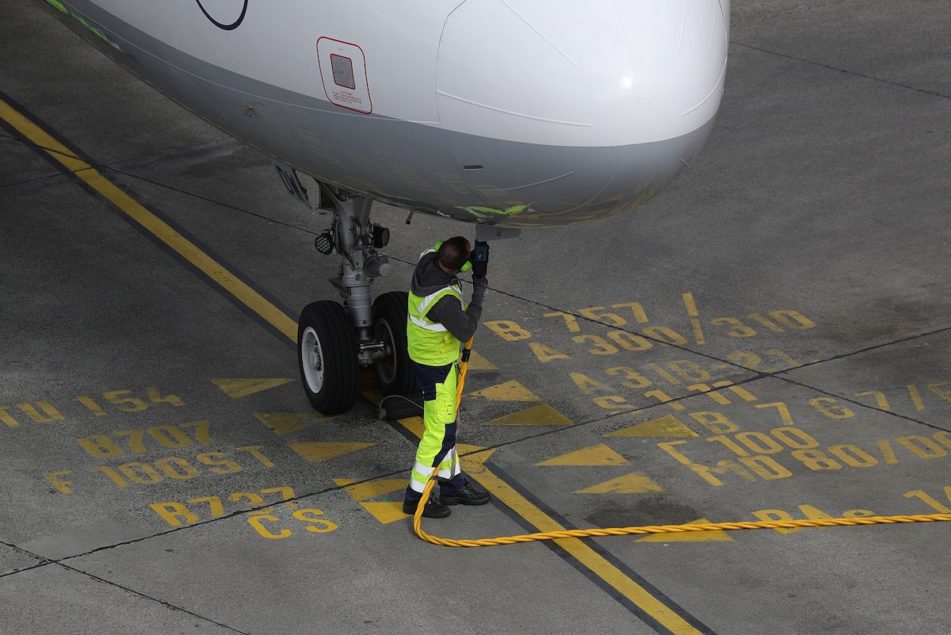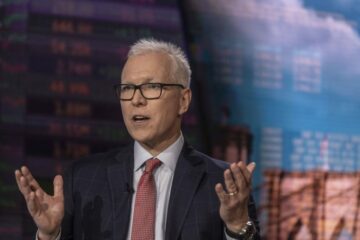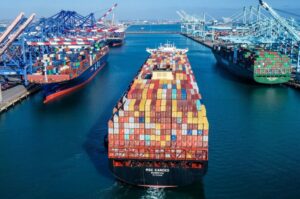
French President Emmanuel Macron said public authorities will help fund a €1 billion ($1.1 billion) plant to produce sustainable aviation fuel and continue to support research to help private companies develop cleaner planes.
The airline industry is under increased public pressure to reduce its carbon emissions as the European Union seeks to step up its fight against global warming and reduce the bloc’s reliance on imported fossil fuels. The region is drawing up mandates to increase the use of renewable kerosene by 2030, which is several times more expensive to produce than jet-fuel made with oil.
“The aerospace industry accounts for 3% to 4% of global CO2 emissions,” Macron said in a June 16 speech at a Safran SA site that makes aircraft engines in Villaroche, near Paris. “We, the French, have to be the champions of ultra-clean planes.”
Read more: U.S. Airlines’ Fuel Consumption Levels Returned to Pre-Pandemic Levels in April
The government will provide €200 million to help develop renewable jet-fuel projects, including one developed in southern France by French startup Elyse Energy, Macron said. The biofuel company and its partners, such as Avril, Axens SA, TotalEnergies SE and a unit of Thyssenkrupp AG, plan to invest €1 billion to produce synthetic jet-fuel with wood waste and low-carbon hydrogen, as well as feedstock for the chemical industry, the startup said in a separate statement June 16.
Elyse Energy still needs to complete engineering studies, obtain construction permits and progress on the financing of the project, its co-founder and chairman, Pascal Penicaud, said in a phone interview June 16. The firm isn’t aware of the amount it will get from the government at this stage, he said.
The goal is to reach a final investment decision by 2026 to open the plant in 2028, while it may decide in 2025 to build a plant nearby to produce synthetic methanol to be used as a maritime fuel, Penicaud said.
The government will also provide €50 million to startups that are seeking to develop electric and hydrogen solutions for business jets, Macron said. The state has been handing out €2.3 billion in aid in the 2020-23 period to help decarbonize the aviation industry as part of its France 2030 initiative, which is targeting about €15 billion in public and private investment over several years on greening the sector.
France is home to European plane maker Airbus SE and business jet maker Dassault Aviation SA. The sector is key for its exports, with net exports representing €22.8 billion in 2022, according to industry lobby GIFAS.
Read more: Airbus Predicts Asia to Lead Air Traffic Boom in Coming Decades
Macron is seeking to turn the page on his unpopular pension reform with a string of public investments that started during the week of June 12 with the pharmaceutical sector. The government has also been trying to find a balance between supporting the aviation industry after the COVID-19 pandemic and pushing the sector’s green transition.
A recently implemented rule banning plane journeys that can instead be made by train in less than 2.5 hours has been weakened by exemptions, for example whenever flights are in transit via Charles de Gaulle airport outside Paris. The government has said it wants to tax airline tickets to help fund green investments, a plan that has triggered pushback from airlines.
Franco-Dutch airline Air France-KLM praised the announcements in a statement, saying the measures were key to lower carbon emissions of the sector through biofuels, new planes and training for pilots.
- SEO Powered Content & PR Distribution. Get Amplified Today.
- EVM Finance. Unified Interface for Decentralized Finance. Access Here.
- Quantum Media Group. IR/PR Amplified. Access Here.
- PlatoAiStream. Web3 Data Intelligence. Knowledge Amplified. Access Here.
- Source: https://www.supplychainbrain.com/articles/37493-france-grants-aid-for-1bn-green-jet-fuel-plant
- :has
- :is
- $UP
- 1
- 12
- 16
- 2022
- 2025
- 2026
- 2028
- 2030
- 8
- a
- About
- According
- Accounts
- Aerospace
- After
- AG
- against
- Aid
- AIR
- Airbus
- aircraft
- airline
- Airlines
- airport
- also
- amount
- and
- Announcements
- ARE
- AS
- asia
- At
- Authorities
- aviation
- aware
- Balance
- BE
- been
- between
- Billion
- boom
- build
- business
- by
- CAN
- carbon
- carbon emissions
- chairman
- Champions
- Charles
- chemical
- Co-founder
- co2
- co2 emissions
- coming
- Companies
- company
- complete
- construction
- consumption
- continue
- COVID-19
- COVID-19 pandemic
- decide
- decision
- develop
- developed
- drawing
- during
- Electric
- Emissions
- Emmanuel Macron
- energy
- Engineering
- Engines
- European
- european union
- example
- expensive
- exports
- fight
- final
- financing
- Find
- Firm
- Flights
- For
- fossil
- fossil fuels
- France
- French
- from
- Fuel
- fuels
- fund
- get
- Global
- global warming
- goal
- Government
- grants
- Green
- Have
- he
- help
- his
- Home
- HOURS
- HTTPS
- hydrogen
- implemented
- in
- Including
- Increase
- increased
- industry
- Initiative
- instead
- Interview
- Invest
- investment
- Investments
- IT
- ITS
- Jets
- Journeys
- jpg
- june
- Key
- lead
- less
- levels
- Lobby
- low-carbon
- lower
- made
- maker
- MAKES
- mandates
- Maritime
- May..
- measures
- Methanol
- million
- more
- Near
- needs
- net
- New
- obtain
- of
- Oil
- on
- ONE
- open
- out
- outside
- over
- page
- pandemic
- paris
- part
- partners
- pension
- period
- Pharmaceutical
- phone
- Pilots
- plan
- Planes
- plato
- Plato Data Intelligence
- PlatoData
- Praised
- Predicts
- president
- pressure
- private
- Private Companies
- produce
- Progress
- project
- projects
- provide
- public
- Pushing
- reach
- recently
- reduce
- reform
- region
- reliance
- Renewable
- representing
- research
- Rule
- s
- SA
- Said
- saying
- sector
- seeking
- Seeks
- separate
- several
- site
- Solutions
- Southern
- speech
- Stage
- started
- startup
- Startups
- State
- Statement
- Step
- Still
- String
- studies
- such
- support
- Supporting
- sustainable
- sustainable aviation fuel
- synthetic
- targeting
- tax
- than
- that
- The
- The State
- this
- Through
- tickets
- times
- to
- traffic
- Train
- Training
- transit
- transition
- triggered
- TURN
- under
- union
- unit
- use
- used
- via
- wants
- Waste
- week
- WELL
- were
- whenever
- which
- while
- will
- with
- wood
- years
- zephyrnet












